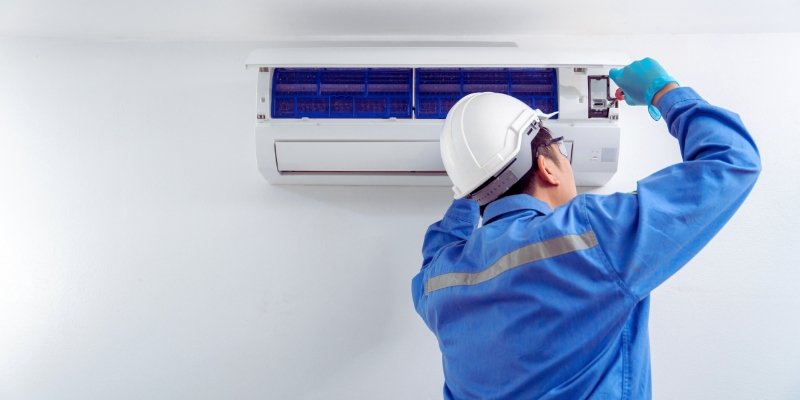Establishing an Air Conditioning Business in Singapore: A Guide for Aspiring Entrepreneurs

As Singapore continues to experience rapid urbanization and a growing population, the demand for air conditioning services is on the rise. With its tropical climate, air conditioning has become an essential part of daily life for both residential and commercial spaces. For aspiring entrepreneurs, establishing an air conditioning business in Singapore presents a lucrative opportunity. This guide will provide you with essential insights into the steps, challenges, and financial considerations involved in launching your air conditioning business.
Reasons to Start an Air Conditioning Business in Singapore

High Demand for Services: Singapore’s hot and humid climate creates a consistent need for air conditioning systems in homes, offices, and commercial establishments. As more buildings are constructed, the demand for installation, maintenance, and repair services will continue to grow.
Government Initiatives: The Singapore government supports businesses that promote energy efficiency and sustainability. Entrepreneurs can benefit from various grants and incentives aimed at improving HVAC (heating, ventilation, and air conditioning) systems to enhance energy efficiency.
Technological Advancements: The air conditioning industry is evolving with new technologies, such as energy-efficient systems and smart home integration. Entrepreneurs who stay updated with these advancements can offer innovative solutions that appeal to modern consumers.
Potential for Diversification: An air conditioning business can expand into related areas, such as installation of smart home systems, air quality management, and energy audits, allowing for diversified revenue streams.
Detailed Steps to Establish an Air Conditioning Business

Conduct Market Research: Start by analyzing the local air conditioning market. Identify your target audience, understand their needs, and study your competitors. This research will help you define your niche and tailor your services accordingly.
Create a Comprehensive Business Plan: A solid business plan is essential for your air conditioning business. Outline your business objectives, target market, service offerings, marketing strategies, and financial projections. This document will serve as your roadmap.
Register Your Business: Choose a suitable business structure (e.g., sole proprietorship, partnership, or private limited company) and register your business with the Accounting and Corporate Regulatory Authority (ACRA) in Singapore.
Obtain Necessary Licenses and Certifications: The air conditioning industry requires specific licenses and certifications. Ensure compliance with the regulations set by the Ministry of Manpower and the National Environment Agency. You may need to obtain a license for handling refrigerants and other specialized equipment.
Set Up Your Operations: Identify a suitable location for your operations, considering factors such as accessibility and proximity to your target market. Invest in the necessary tools, equipment, and vehicles to support your air conditioning services.
Develop a Marketing Strategy: Create a marketing plan to promote your air conditioning business. Utilize digital marketing, local advertising, and social media to raise awareness and attract customers. Building a strong online presence is crucial in today’s digital age.
Build Relationships with Suppliers: Establish connections with suppliers for air conditioning units, parts, and tools. Having reliable suppliers will ensure you can provide quality services and maintain customer satisfaction.
Challenges and Considerations for Both Local and Foreign Entrepreneurs

Starting an air conditioning business in Singapore comes with its unique challenges that both local and foreign entrepreneurs must navigate.
High Competition: The air conditioning market in Singapore is competitive, with numerous established players. New entrepreneurs must differentiate their services and offer exceptional customer service to stand out.
Regulatory Compliance: Navigating the regulatory landscape can be complex. Entrepreneurs must stay informed about licensing requirements, safety standards, and environmental regulations to ensure compliance.
Skill Development: The air conditioning industry requires specialized skills and knowledge. Entrepreneurs must invest in training and development for themselves and their staff to keep up with industry standards and technological advancements.
Economic Fluctuations: Economic downturns can impact consumer spending on non-essential services. Entrepreneurs should be prepared to adapt their business strategies during challenging economic times.
Financial Planning Aspects

Effective financial planning is critical for the success of your air conditioning business. Here are some key considerations:
Startup Costs: Calculate all initial expenses, including equipment, tools, licenses, and operational costs. A detailed budget will help you understand your financial requirements and plan accordingly.
Funding Options: Explore various funding avenues, such as government grants, loans, and private investors. The Singapore government offers several funding programs aimed at supporting small and medium-sized enterprises (SMEs).
Pricing Strategy: Determine a competitive pricing structure for your services. Consider factors such as market rates, service complexity, and your target clientele to establish a viable pricing strategy.
Cash Flow Management: Monitor your cash flow closely to ensure you can cover operational expenses. Implementing a robust accounting system will help you track income and expenses effectively.
Conclusion
Establishing an air conditioning business in Singapore presents a unique opportunity for aspiring entrepreneurs. By understanding the market dynamics, navigating regulatory requirements, and focusing on customer service and innovation, you can create a successful venture in this essential industry. If you are ready to take the next step, contact Company Formation Specialist today for expert guidance and support in setting up your air conditioning business. Let us help you turn your entrepreneurial vision into reality!
Frequently Asked Questions
1. Why is starting an air conditioning business a good opportunity in Singapore?
Answer: Starting an air conditioning business in Singapore is a great opportunity due to the high demand for cooling systems in both residential and commercial properties. The tropical climate, coupled with urbanization, ensures a continuous need for installation, maintenance, and repair services.
2. What government support is available for air conditioning businesses in Singapore?
Answer: The Singapore government offers grants and incentives to promote energy efficiency in HVAC systems. These initiatives help entrepreneurs in the air conditioning sector by encouraging the adoption of energy-efficient solutions.
3. What are the key steps to starting an air conditioning business in Singapore?
Answer: The key steps include conducting market research, creating a business plan, registering your business, obtaining the necessary licenses and certifications, setting up operations, developing a marketing strategy, and building supplier relationships.
4. What are the common challenges when starting an air conditioning business in Singapore?
Answer: Challenges include high competition, regulatory compliance, the need for specialized skills, and adapting to economic fluctuations. Entrepreneurs need to be prepared to navigate these challenges effectively.
5. Do I need any specific licenses or certifications to start an air conditioning business in Singapore?
Answer: Yes, you will need specific licenses, such as a refrigerant handling license, and certifications from the Ministry of Manpower and the National Environment Agency to comply with regulations in the air conditioning industry.
6. How can I manage the financial planning for my air conditioning business?
Answer: Financial planning involves calculating startup costs, exploring funding options (e.g., government grants and loans), setting a competitive pricing structure, and monitoring cash flow to ensure the sustainability of the business.
7. What skills are required to run an air conditioning business?
Answer: Skills in HVAC technology, installation, maintenance, and repair are essential. Additionally, entrepreneurs should invest in continuous training to keep up with new technologies and industry standards.
8. Is there a market for air conditioning services in both residential and commercial sectors?
Answer: Yes, there is a strong market for air conditioning services in both sectors. As the population grows and more commercial spaces are built, the demand for air conditioning systems and their services continues to rise.
9. What kind of marketing strategy should I use for my air conditioning business?
Answer: A good marketing strategy should include a mix of digital marketing, local advertising, and social media outreach. Building a solid online presence is crucial to attract and retain customers.
10. How do I differentiate my air conditioning business from competitors?
Answer: To stand out, you can focus on offering exceptional customer service, providing energy-efficient solutions, staying updated with the latest technological advancements, and targeting niche markets such as smart home systems and air quality management.

